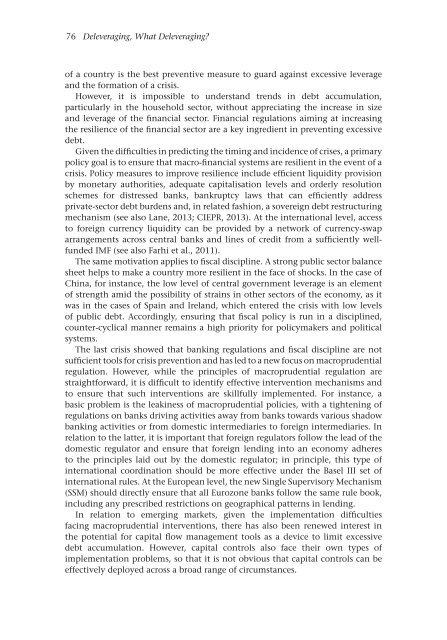1qGLG9p
1qGLG9p
1qGLG9p
Create successful ePaper yourself
Turn your PDF publications into a flip-book with our unique Google optimized e-Paper software.
76 Deleveraging, What Deleveraging<br />
of a country is the best preventive measure to guard against excessive leverage<br />
and the formation of a crisis.<br />
However, it is impossible to understand trends in debt accumulation,<br />
particularly in the household sector, without appreciating the increase in size<br />
and leverage of the financial sector. Financial regulations aiming at increasing<br />
the resilience of the financial sector are a key ingredient in preventing excessive<br />
debt.<br />
Given the difficulties in predicting the timing and incidence of crises, a primary<br />
policy goal is to ensure that macro-financial systems are resilient in the event of a<br />
crisis. Policy measures to improve resilience include efficient liquidity provision<br />
by monetary authorities, adequate capitalisation levels and orderly resolution<br />
schemes for distressed banks, bankruptcy laws that can efficiently address<br />
private-sector debt burdens and, in related fashion, a sovereign debt restructuring<br />
mechanism (see also Lane, 2013; CIEPR, 2013). At the international level, access<br />
to foreign currency liquidity can be provided by a network of currency-swap<br />
arrangements across central banks and lines of credit from a sufficiently wellfunded<br />
IMF (see also Farhi et al., 2011).<br />
The same motivation applies to fiscal discipline. A strong public sector balance<br />
sheet helps to make a country more resilient in the face of shocks. In the case of<br />
China, for instance, the low level of central government leverage is an element<br />
of strength amid the possibility of strains in other sectors of the economy, as it<br />
was in the cases of Spain and Ireland, which entered the crisis with low levels<br />
of public debt. Accordingly, ensuring that fiscal policy is run in a disciplined,<br />
counter-cyclical manner remains a high priority for policymakers and political<br />
systems.<br />
The last crisis showed that banking regulations and fiscal discipline are not<br />
sufficient tools for crisis prevention and has led to a new focus on macroprudential<br />
regulation. However, while the principles of macroprudential regulation are<br />
straightforward, it is difficult to identify effective intervention mechanisms and<br />
to ensure that such interventions are skillfully implemented. For instance, a<br />
basic problem is the leakiness of macroprudential policies, with a tightening of<br />
regulations on banks driving activities away from banks towards various shadow<br />
banking activities or from domestic intermediaries to foreign intermediaries. In<br />
relation to the latter, it is important that foreign regulators follow the lead of the<br />
domestic regulator and ensure that foreign lending into an economy adheres<br />
to the principles laid out by the domestic regulator; in principle, this type of<br />
international coordination should be more effective under the Basel III set of<br />
international rules. At the European level, the new Single Supervisory Mechanism<br />
(SSM) should directly ensure that all Eurozone banks follow the same rule book,<br />
including any prescribed restrictions on geographical patterns in lending.<br />
In relation to emerging markets, given the implementation difficulties<br />
facing macroprudential interventions, there has also been renewed interest in<br />
the potential for capital flow management tools as a device to limit excessive<br />
debt accumulation. However, capital controls also face their own types of<br />
implementation problems, so that it is not obvious that capital controls can be<br />
effectively deployed across a broad range of circumstances.


